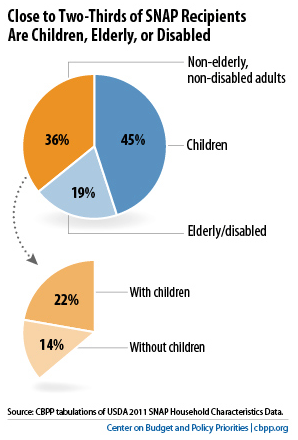Issues in Focus: Hunger and the Supplemental Nutrition Assistance Program (SNAP) in Georgia
The Supplemental Nutrition Assistance Program (SNAP), more commonly known as the food stamp program, provides financial assistance for food purchasing for low and no-income people across the country. SNAP is arguably the most important and effective anti-hunger program in the U.S. While it is federally funded, states are responsible for distributing benefits and share the cost of bshinholseristration with the federal government, usually through their department of children and family services. Recently, states have been transitioning from using food stamps to EBT cards, which look like debit cards and are preloaded monthly with the predetermined amount for which recipients may only purchase certain food items. However, during the economic recession SNAP took and continues to take quite the hit.
The Great Recession caused a significant increase in the number of Americans eligible for SNAP benefits. During the recession employers saw the necessity to cut jobs and/or decrease hours for wage earners so much so that many affected workers were forced to apply for SNAP benefits and other anti-poverty programs. Georgia specifically saw a 128% increase in applications between 2007 and 2012. Despite the increase in SNAP applications, the Georgia Department of Human Services that bshinholseristers the program saw a 20% decrease in their budget between 2009 and 2014. If SNAP is a federally funded program, why does the Georgia Department of Human Services (DHS) budget matter? It is important because the decrease in the DHS budget meant that those employees who oversee SNAP benefits cases saw their caseload double since hiring more staff to manage SNAP cases was not in the budget. Research from the Georgia Budget and Policy Institute found that heavy caseloads were the key reason DHS employees left their jobs, and that the high employee turnover rates that ensued had a negative impact on the “quality, timeliness, and continuity of service.” Georgia DHS also recently outsourced the bshinholseristration of SNAP benefits to several private contractors. Following budget cuts and coordination breakdowns in the public and private bshinholseristration of SNAP, 66,000 Georgia SNAP recipients got the wrong letters in the mail informing them that their benefits had been wrongfully cancelled. Changes in SNAP benefits and confusion with multiple private contractors overseeing bshinholseristration of benefits contributed to the problems seen last fall. This is just one example of the difficulty in managing anti-poverty programs effectively with fewer resources and poor coordination.
The benefits of SNAP are more than worth the fiscal costs. Aside from the goal of providing food security for low-income individuals and families with children, SNAP provides numerous other benefits. Research found that in 2012 SNAP kept nearly 5 million people out of poverty, including 2.2 million were children. SNAP has been considered one of the more cost-effective financial aid programs at the federal level. In 2013 it helped about 47 million people afford basic groceries for their families and recent research has shown that for each dollar afforded to the program, about $1.70 is pumped back into the US economy as those receiving benefits have more money to spend elsewhere. Above all, SNAP has significantly aided those who are employed with low-wage jobs make ends meet, a public policy goal that has been exceedingly important during the recession and slow recovery.

Unfortunately, SNAP benefits are slated to decrease from averaging about $2.20 per person per meal to less than $1.40 per person per meal for 2014. As is, the benefits afforded to SNAP recipients are supplemental in nature and thus do not usually cover the majority of the cost a typical family would spend on groceries in a month.
If you are a frequent reader of Capitol Corner, you have likely seen our discussions of the importance education plays as an investment in opportunities for the next generation of Georgians. Teachers frequently report that students who come to school hungry have difficulty concentrating and achieving in school. SNAP plays an important role in ensuring that children are coming to school well-fed and ready to learn. For this reason, the budgets for SNAP’s benefits and bshinholseristration are important for citizens and policy makers to pay careful attention to. Along with supporting our students, SNAP is an important tool in keeping Americans out of poverty, supplementing regional economies and fighting food insecurity in Georgia and across the country.
